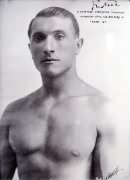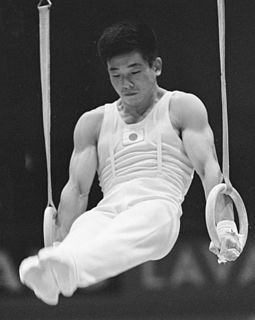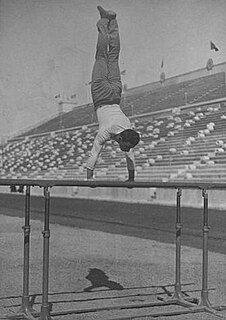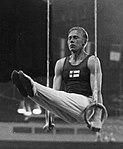
The men's artistic individual all-around was an artistic gymnastics event held as part of the Gymnastics at the 1912 Summer Olympics programme. The competition was held on 12 July at the Stockholm Olympic Stadium. It was the fourth appearance of the event. There were 44 competitors from 9 nations. Each nation was limited to 6 gymnasts. The event was won by Alberto Braglia of Italy, the first man to successfully defend a title in the artistic individual all-around. The bronze medalist from 1908, Louis Ségura, this time took silver. Braglia and Ségura were the first two men to win multiple medals in the event. Italian Adolfo Tunesi earned bronze.

The men's rings competition was one of eight events for male competitors of the artistic gymnastics discipline contested in the gymnastics at the 2004 Summer Olympics in Athens. The qualification and final rounds took place on August 14 and August 22 at the O.A.C.A. Olympic Indoor Hall. There were 77 competitors from 28 nations, with nations competing in the team event having up to 5 gymnasts and other nations having up to 2 gymnasts. The event was won by Dimosthenis Tampakos of Greece, the nation's first victory in the rings since 1896 and second overall. Yordan Yovchev of Bulgaria took silver, while Jury Chechi of Italy earned bronze. All three men had previously won a medal in the event; they were the 9th, 10th, and 11th men to win multiple rings medals.

The men's rings competition at the 2008 Summer Olympics was held on August 18 at the Beijing National Indoor Stadium. The eight competitors with the highest scores in qualifying proceeded to the men's rings finals. There, each gymnast performed again; the scores from the final round determined final ranking. There were 70 competitors from 25 nations that competed on the rings, with nations in the team event entering up to 5 gymnasts while other nations could enter up to 2. The event was won by Chen Yibing of China, the nation's first victory in the rings since 1984. Yang Wei, also of China, took silver. Bronze went to Oleksandr Vorobiov, the nation's first medal in the event.

The men's parallel bars competition at the 2008 Summer Olympics was held on August 9 and 19 at the Beijing National Indoor Stadium. The eight competitors with the highest scores in qualifying proceeded to the men's parallel bars finals. There, each gymnast performed again; the scores from the final round determined the final ranking. There were 75 competitors from 27 nations that competed on the parallel bars, with nations in the team event entering up to 5 gymnasts while other nations could enter up to 2. The event was won by Li Xiaopeng of China, the first man to win three medals in the parallel bars as well as the first man to win two non-consecutive gold medals in the same apparatus. Yoo Won-Chul of South Korea took silver. Anton Fokin won Uzbekistan's first parallel bars medal in its debut as an independent nation.

The men's artistic individual all-around event was part of the gymnastics programme at the 1924 Summer Olympics. It was one of nine gymnastics events and it was contested for the sixth time. The competition was held from Thursday, 17 July 1924, to Wednesday, 23 July 1924. Seventy-two gymnasts from nine nations competed. Each nation could send up to 8 gymnasts, up from 6 in previous Games. For the first time since 1904, the scores for individual competitors were used to calculate a team score. The men's artistic individual all-around was won by Leon Štukelj of Yugoslavia. Czechoslovakia's Robert Pražák took silver, while Bedřich Šupčík earned bronze. Both nations were making their debut in the event.

The men's rings or flying rings event was part of the gymnastics programme at the 1932 Summer Olympics. It was contested for the fifth time after 1896, 1904, 1924, and 1928. The competition was held on Friday, August 12, 1932. Fourteen gymnasts from six nations competed. There were 14 gymnasts from six nations. Each nation was limited to three gymnasts. The event was won by George Gulack of the United States, the nation's first medal in the rings since 1904 and second overall. Another American, Bill Denton, took silver. The United States was not able to complete a repeat of its 1904 sweep, however, as Italy's Giovanni Lattuada beat the third American, Richard Bishop, by one-tenth of a point for the bronze.

The men's artistic individual all-around event was part of the gymnastics programme at the 1932 Summer Olympics. It was the eighth appearance of the event, which was established in 1900. The competition was held from Monday, August 8, 1932, to Wednesday, August 10, 1932. Twenty-four gymnasts from five nations competed. Each nation could enter a team of 5 gymnasts; Hungary sent only 4. The event was won by Romeo Neri of Italy, the nation's first victory in the event since 1920 and fourth overall. István Pelle of Hungary took silver and Heikki Savolainen of Finland earned bronze; it was the first medal in the event for each nation.

The men's rings competition was one of eight events for male competitors in artistic gymnastics at the 2000 Summer Olympics in Sydney. The qualification and final rounds took place on September 16 and 24 at the Sydney Super Dome. There were 78 competitors from 29 nations; nations competing in the team event could have up to 5 gymnasts in the vault, while other nations could have up to 2 gymnasts. The event was won by Szilveszter Csollány of Hungary, the nation's first victory in the rings. Csollány, who had taken silver in 1996, became the eighth man to win multiple medals in the event. The silver this time went to Dimosthenis Tampakos of Greece—the first medal in the event for a Greek gymnast since 1896. Yordan Yovchev earned Bulgaria's first rings medal since 1960 with his bronze.

The men's rings competition was one of eight events for male competitors in artistic gymnastics at the 1996 Summer Olympics in Atlanta. The qualification and final rounds took place on July 20, 22 and 28th at the Georgia Dome. There were 102 competitors from 31 nations, with nations in the team event having up to 7 gymnasts and other nations having up to 3 gymnasts. The event was won by Jury Chechi of Italy, the nation's first victory in the men's rings since 1924 and first medal in the event since 1964. There was a tie for silver, between Szilveszter Csollány of Hungary and Dan Burincă of Romania. It was the best result so far for either nation; Romania had previously had a bronze medalist but this was Hungary's first trip to the podium in the rings.

The men's rings competition was one of eight events for male competitors in artistic gymnastics at the 1992 Summer Olympics in Barcelona. The qualification and final rounds took place on July 27, 29 and August 2 at the Palau dels Esports de Barcelona. There were 93 competitors from 25 nations, with nations in the team event having 6 gymnasts while other nations could have up to 3 gymnasts. The event was won by Vitaly Scherbo of the Unified Team, the fourth time in five Games that a Soviet or former Soviet gymnast won the rings. Li Jing of China earned silver. There was a tie for third, with Andreas Wecker of Germany and Li Xiaoshuang of China each receiving bronze medals. It was the first medal for unified Germany since 1936, though East Germany had won gold and bronze in 1988.

The men's rings competition was one of eight events for male competitors in artistic gymnastics at the 1988 Summer Olympics in Seoul. The qualification and final rounds took place on September 18, 20, and 24th at the Olympic Gymnastics Hall. There were 89 competitors from 23 nations, with nations competing in the team event having 6 gymnasts and other nations having up to 3 gymnasts. For the second consecutive Games, the event ended in a way tie for first place. Dmitry Bilozerchev of the Soviet Union and Holger Behrendt of East Germany each received a gold medal. It was East Germany's first medal in the rings. The Soviets had had an eight-Games medal streak in the event snapped by their boycott of the 1984 Games; Bilozerchev's medal put the nation back on the podium after that one-Games absence. Sven Tippelt, also of East Germany, took bronze.

The men's rings competition was one of eight events for male competitors in artistic gymnastics at the 1968 Summer Olympics in Mexico City. There were 117 competitors from 28 nations, with nations in the team competition having up to 6 gymnasts and other nations entering up to 3 gymnasts. The event was won by Akinori Nakayama of Japan, the nation's second consecutive victory in the rings event. Mikhail Voronin took silver to extend the Soviet Union's podium streak in the event to five Games, while Sawao Kato of Japan finished with bronze.

The men's rings competition was one of eight events for male competitors in artistic gymnastics at the 1960 Summer Olympics in Rome. It was held on 5, 7, and 10 September at the Baths of Caracalla. There were 129 competitors from 28 nations, with nations in the team competition having up to 6 gymnasts and other nations entering up to 2 gymnasts. The event was won by Albert Azaryan of the Soviet Union, the first man to successfully defend an Olympic title in the rings. Boris Shakhlin took silver, making it the third consecutive Games the Soviets finished in the top two. Takashi Ono tied with Velik Kapsazov for bronze, giving Japan its second consecutive Games with at least one bronze medal and Bulgaria its first medal in the rings.

The men's rings competition at the 2016 Summer Olympics was held at the HSBC Arena on 6 and 15 August. There were 70 competitors from 34 nations. The event was won by Eleftherios Petrounias of Greece, the nation's first medal in the men's rings since 2004. Defending champion Arthur Zanetti of Brazil finished second, making him the 13th man to win multiple medals in the event. Denis Ablyazin earned Russia's first post-Soviet medal in the event with his bronze.
The men's rings event at the 2020 Summer Olympics was held on 24 July and 2 August 2021 at the Ariake Gymnastics Centre. Approximately 70 gymnasts from 35 nations competed on rings in the qualifying round.

The men's rings competition at the 1936 Summer Olympics was held at the Waldbühne on 10 and 11 August. It was the sixth appearance of the event. There were 111 competitors from 14 nations, with each nation sending a team of up to 8 men. The event was won by Alois Hudec of Czechoslovakia, the nation's first victory after winning two silver medals and two bronze medals in 1924 and 1928. Leon Štukelj was the silver medalist in Berlin, the second man to earn two medals in the rings after his 1928 gold. Host Germany took a bronze medal, its first in the rings since 1896, as Matthias Volz finished third.

The vault is an artistic gymnastics event held at the Summer Olympics. The event was first held for men at the first modern Olympics in 1896. It was held again in 1904, but not in 1900, 1908, 1912, or 1920 when no apparatus events were awarded medals. The vault was one of the components of the men's artistic individual all-around in 1900, however. The men's vault returned as a medal event in 1924 and has been held every Games since. Vault scores were included in the individual all-around for 1924 and 1928, with no separate apparatus final. In 1932, the vault was entirely separate from the all-around. From 1936 to 1956, there were again no separate apparatus finals with the vault scores used in the all-around. The women's vault was added in 1952 and has been held every Games since. Beginning in 1960, there were separate apparatus finals.

The pommel horse is an artistic gymnastics event held at the Summer Olympics. The event was first held for men at the first modern Olympics in 1896. It was held again in 1904, but not in 1900, 1908, 1912, or 1920 when no apparatus events were awarded medals. The pommel horse was one of the components of the men's artistic individual all-around in 1900, however. The men's pommel horse returned as a medal event in 1924 and has been held every Games since. Pommel horse scores were included in the individual all-around for 1924 and 1928, with no separate apparatus final. In 1932, the pommel horse was entirely separate from the all-around. From 1936 to 1956, there were again no separate apparatus finals with the pommel horse scores used in the all-around. Beginning in 1960, there were separate apparatus finals.

The parallel bars is an artistic gymnastics event held at the Summer Olympics. The event was first held for men at the first modern Olympics in 1896. It was held again in 1904, but not in 1900, 1908, 1912, or 1920 when no apparatus events were awarded medals. The parallel bars was one of the components of the men's artistic individual all-around in 1900, 1908, and 1912, however. The men's parallel bars returned as a medal event in 1924 and has been held every Games since. Parallel bars scores were included in the individual all-around for 1924 and 1928, with no separate apparatus final. In 1932, the parallel bars was entirely separate from the all-around. From 1936 to 1956, there were again no separate apparatus finals with the parallel bars scores used in the all-around. Beginning in 1960, there were separate apparatus finals.

The horizontal bar is an artistic gymnastics event held at the Summer Olympics. The event was first held for men at the first modern Olympics in 1896. It was held again in 1904, but not in 1900, 1908, 1912, or 1920 when no apparatus events were awarded medals. The horizontal bar was one of the components of the men's artistic individual all-around in 1900, 1908, and 1912, however. The men's horizontal bar returned as a medal event in 1924 and has been held every Games since. Horizontal bar scores were included in the individual all-around for 1924 and 1928, with no separate apparatus final. In 1932, the horizontal bar was entirely separate from the all-around. From 1936 to 1956, there were again no separate apparatus finals with the horizontal bar scores used in the all-around. Beginning in 1960, there were separate apparatus finals.

























